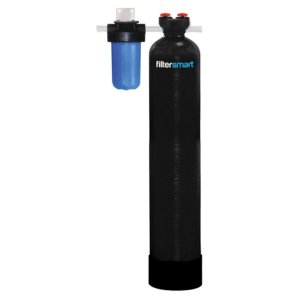Table of Contents

Since the minerals are removed during the cleaning process, the tap water is no longer contaminated with the kinds of particles that might cause the hardness of the water.
However, another technology, known as a water conditioner, does almost the same thing with minor differences. Its method of operation and capacity to purify and remove dirt and chloride ultimately enhance the water’s flavor.
Water Softener Vs Water Conditioner – What Is The Difference?
Water is filtered in different ways by each. Yet, they both aim for the same thing in different ways.
Water Softeners
Functionality
One way to treat hard water is to install a system like a water softener that filters out particles like magnesium and calcium. It achieves this result by including salt in the process. After that, the resin beads are cleansed with water. The elements, whether beneficial or harmful, are trapped inside.
The resin bed is drained, and the salts are replenished periodically because of the accumulation of such particles. This device uses sodium and a filtering system, which needs regular servicing and upkeep.
Cost
It might cost you a lot if you live in a location with particularly hard water. A water softening system for a single-family home may cost approximately $900 to $2,600, with price variations based on size, kind, manufacturer, and implementation. You should pay $25-$60 monthly, depending on your preferences. Consider the quality of the living area water before deciding how much to invest in a water softener.
Water Conditioners
Functionality
It is a machine that works in a way that doesn’t need salt. Despite getting rid of the beneficial minerals, it alters how they combine using pipes, heating systems, and home appliances. This healthy mineral supplement is great for you. Their continued presence is crucial.
Furthermore, it only needs regular upkeep or extra costs like salt. Water conditioners may save homeowners time and expense on equipment repairs by preventing scale formation buildup. The beneficial mineral resources in the water are a bonus to your wellness. The water is modified in many ways by a water conditioner.
Cost
A water softener and water conditioner have comparable costs. They range in price from around $900 to $2,600 based on variables like size, model, manufacturer, and implementation. Due to the lack of salt, they do not require ongoing maintenance or repair.
What’s The Similarity Between A Water Softener And A Water Conditioner?
Hard water is an issue that both devices can remedy. The presence of dissolved particles, including calcium, illustrate hard water. As a result of their existence, these particles are the true source of contaminating the water. Both devices help remove the hardness of the water.
Which Choice Is The Best One?
A water softener is your best choice to get rid of everything in the water and make it safe to drink. A water softener is preferable to a water conditioner because it may eliminate hardness while softening the water. Advantages include less need for washing and soap since roughness grains are kept off of surfaces and less wear and tear on equipment.
There is also a review on Morton Water Softener for those interested in installing a new system.
Conclusion
A water conditioner is more efficient and can eliminate contaminants like chlorine without wasting too much water. On the other hand, a water softener will filter out any hardness in the water supply.


